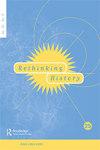反思:关于写作和被写作
IF 0.8
2区 历史学
Q1 HISTORY
引用次数: 0
摘要
我是如何开始把我遇到的问题写下来的?命运的某些偶然事件决定性地影响了我持久的智力兴趣,也影响了我追求这些兴趣的机会。事实证明,哲学为我提供了一个适合我特殊兴趣的学术家园。在这方面,怀特的《历史的负担》(Burden of History)中的一句话抓住了我长期以来试图解决的一个挑战:“我们选择过去,就像我们选择未来一样。”为这一观点形成一个哲学基础指导了我的大部分写作。哲学家不是事实的仲裁者。但是哲学的一个决定性特征涉及到如何避免使较弱的论点显得更强。在我看来,理性需要明确推理结构。我为“复兴”历史分析哲学所做的努力,正如我所写的或希望写的那样,反映了我正在努力调和一种被认为是理性的偶然性的感觉,以及一种认为某些论点比其他论点更好的信念。在这方面,重新想象逻辑以包含一种叙事形式,允许重新思考“历史的负担”是否证明是史学所独有的。我不这么认为。本文章由计算机程序翻译,如有差异,请以英文原文为准。
Reflections: on writing and being written about
ABSTRACT How did I come to write about the problems that I do? Certain accidents of fate determinatively impacted both my enduring intellectual interests as well as my opportunities to pursue them. Philosophy proved to provide an academic home that accommodated my peculiar interests. In this regard, a quote from White’s ‘Burden of History’ captured a challenge that I long sought to address: ‘We choose our past in the same way we choose our future’. Fashioning a philosophical rationale for this view guided much of my writing. Philosophers are not arbiters of matters of fact. But a defining feature of philosophy involves worries about how to avoid making weaker arguments appear the stronger. Rationality as I understand the notion requires making inferential structure explicit. My efforts to ‘revive’ analytical philosophy of history as with much of what I have written or hope to write reflect ongoing attempts to reconcile a sense of the contingency of what passes for rationality and a belief that some arguments are better than others. In this regard, reimagining logic to include a narrative form permits a rethinking of whether or not the ‘Burden of History’ proves unique to historiography. I argue not.
求助全文
通过发布文献求助,成功后即可免费获取论文全文。
去求助
来源期刊

Rethinking History
Multiple-
CiteScore
1.20
自引率
0.00%
发文量
26
期刊介绍:
This acclaimed journal allows historians in a broad range of specialities to experiment with new ways of presenting and interpreting history. Rethinking History challenges the accepted ways of doing history and rethinks the traditional paradigms, providing a unique forum in which practitioners and theorists can debate and expand the boundaries of the discipline.
 求助内容:
求助内容: 应助结果提醒方式:
应助结果提醒方式:


